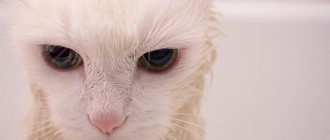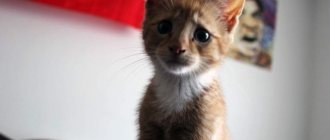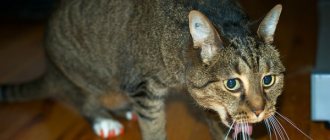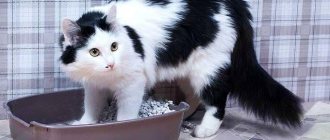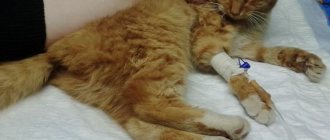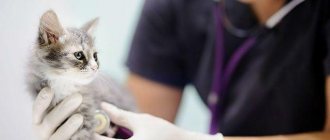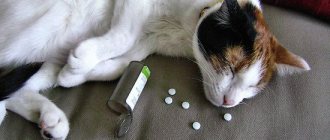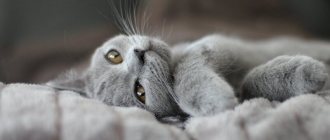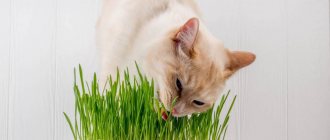Diarrhea in a cat causes concern not only for the pet itself, but also for its owner. It is easy to recognize the problem by frequent bowel movements, unusual color and consistency of feces, and a strange smell. There are many reasons for this condition; only a veterinarian can make an accurate diagnosis after examination and collection of tests.
Symptoms of diarrhea in a cat
If a cat has eaten something stale or unusual, then diarrhea may be accompanied by frequent bowel movements, flatulence, and bloating. In the case of a disease, the number of symptoms can increase to a dozen.
Signs of pathological stool disorder
In addition to soft feces, loose stools in a cat are accompanied by the following symptoms:
:
- apathetic behavior;
- vomit;
- lack of appetite;
- weight loss due to long-term disorder;
- dangerous dehydration;
- impurities of blood, mucus, undigested pieces of food;
- temperature increase;
- hard belly
Properly selected treatment will help get rid of the pathology without a trace. However, a veterinarian will be able to formulate a complete picture of the disease after receiving information about the patient’s behavior over the past few days. During the examination, the specialist will check your body temperature, feel the abdominal area, and determine the degree of dehydration. Analyzes of discharge for the presence of parasites or impurities, as well as x-rays, will help diagnose the cause of the disease with the greatest accuracy.
Duration of diarrhea in a cat
The appearance and disappearance of symptoms of pathology can go unnoticed by the owner. In an isolated case of diarrhea in a cat, there is nothing to worry about, but prolonged distress becomes an alarming sign. Doctors talk about three forms of pathology:
- Acute type, which is accompanied by painful, frequent bowel movements. The malaise lasts for several days.
- Chronic form, lasting more than 7 days and causing severe exhaustion with dehydration.
- The intermittent type is periodic in nature. It sometimes returns within 1 month.
Diarrhea in a cat, which appears due to an incorrectly selected menu, goes away quickly after changing the diet. The functioning of the gastrointestinal tract is restored, and stool returns to normal. Therapeutic nutrition involves a diet with limited food and plenty of water. Diseases of another type require great attention from the veterinarian and the owner.
Some features of the disorder in kittens
In a kitten, diarrhea may begin suddenly, due to a weak gastrointestinal tract. Children are more susceptible to attacks from viruses and bacteria than adults, and also react more strongly to stale or too fatty foods.
A kitten that has just been weaned from its mother often has bowel movements. To prevent this from happening, it is better to take the kitten from the family where it was gradually transferred to solid food. A sharp separation from mother's milk can provoke a number of diseases - and not only gastrointestinal ones.
In some cases, loose stool in a kitten signals serious diseases for which it was not vaccinated yet - panleukopenia (distemper) or leptospirosis. Here, the chances of survival depend on the speed of treatment and the baby’s immune system.
Only a veterinarian can tell you how to treat diarrhea in a kitten, since any prescription of drugs must be strictly adjusted in dose and duration of use. The main task of the owner before prescribing therapy is to replenish the lack of fluid in the baby’s body.
Digestive problems in a pregnant or lactating female
The expectant mother is more susceptible to attacks from viruses or bacteria than other individuals. Any pathogenic microorganisms that enter the body of a pregnant female cause problems in the gastrointestinal tract. New foods can also cause intolerance and intestinal reactions. Such products include beef, horse meat, soybeans, fatty fish, chicken eggs, and high-calorie dairy products.
Often, even habitual food causes frequent bowel movements in a pregnant female. You should not feed an eternally hungry expectant mother with food from the master's table. Excessive amounts of food do not have time to be digested, leaving in the form of liquid feces. This pathology can provoke a miscarriage. However, the appearance of diarrhea a couple of days before giving birth is considered normal.
The factor that provokes diarrhea in a nursing female is most often milk. Its excessive consumption in its natural form is not very beneficial for the pet. Milk should be replaced with cottage cheese, fermented baked milk, kefir or unsweetened yogurt.
Another reason for weakened intestines can be hormonal changes in the body or postpartum stress. Due to feeding, the water-salt balance is disrupted.
Causes of diarrhea in a kitten or cat
A variety of factors can be responsible for the appearance of loose stools in a cat. First of all, these are various pathologies: inflammation of the gastrointestinal tract, uncontrolled use of antibiotics, intoxication, parasites, various infections. The list also includes oncology and diabetes.
Pathological causes of diarrhea in cats include diseases of internal organs not directly related to the gastrointestinal tract. These are diseases of the kidneys and liver, pancreas, and sometimes fungal infections.
In particularly dangerous cases, the cause may be a foreign body stuck in one of the intestinal sections. It usually causes severe pain in the pet. It is easy to determine soreness: you need to palpate (feel) the abdomen. If the cat is in pain in one specific place, it is necessary to urgently go to the veterinary hospital. Soreness does not always indicate a foreign body, but it is better to be on the safe side.
There are breeds that are the most picky about diet and new dishes. Devon rexes and Canadian sphinxes are considered such animals. They have a rather unstable digestive system, so stool failures occur frequently.
The cause of diarrhea in a cat is not always caused by something dangerous - there is a possibility that the following factors have a negative impact:
- change of feed;
- excess fatty foods;
- binge eating;
- stress.
In this case, you can avoid contacting a veterinarian, but stabilize your pet’s condition by returning to normal food and a gentle lifestyle. If you notice diarrhea and vomiting in a kitten or a pregnant female, in any case you need medical advice.
When to contact a veterinarian
Diarrhea in cats should be treated by a veterinarian, especially if the diarrhea lasts more than 24 hours and is accompanied by the following clinical picture:
- increased body temperature;
- weakness;
- pain in the abdominal area;
- frequent vomiting;
- impurities of blood and mucus in the stool;
- fetid odor of decomposition from feces;
- nervous phenomena.
If the cat can drink water on its own, then before sending it to the clinic or visiting a veterinarian, you need to provide it with plenty of fluids.
How are the causes of diarrhea identified?
To prescribe the correct treatment at home, a veterinarian must identify the causes of diarrhea in the cat. Diagnostic tests include:
- examination and collection of anamnestic data;
- detection of parasites in feces using flotation, specific staining and PCR;
- general and biochemical blood test;
- determination of the amount of pancreatic and thyroid hormones (if necessary);
- Ultrasound of the abdominal organs;
- endo- and colonoscopy.
To determine the type of tumor, a veterinarian will order a biopsy.
Types of diarrhea in cats
Any digestive disorders require the use of drug therapy and a therapeutic diet. A veterinarian will help solve the problem by finding out the root cause. Analysis of the consistency and color of stool, as well as detection of accompanying symptoms, helps to see the full clinical picture. Therefore, it is important for the owner, if not to collect the biomaterial, then at least to remember what it looks like.
Diarrhea in a cat without complications
The disease without any complications can be caused by many factors. For example, banal overeating becomes a factor of malaise. This is easy to notice by the behavior of a mustachioed pet. He does not lose his appetite, his playful mood remains, but even an isolated incident becomes a reason for special control over the diet. You need to be wary if the feces acquire a different color and an uncharacteristic smell. Then you cannot avoid visiting the clinic.
Cat has diarrhea with water
Liquid bowel movements may be one-time in nature, but this also serves as a signal of certain ailments. Watery stool that lasts longer than one day is a reason to consult a veterinarian. Recommendations can be obtained by phone, answering the specialist’s questions in detail.
If there is no vomiting, you can help your pet at home by using boiled water at room temperature. Consuming it will help avoid dehydration, which is dangerous for your mustachioed friend. Food of any type is greatly reduced or completely removed for no more than a day until the pathology disappears. In the future, the condition is monitored, especially after feeding.
Loose stool in a cat with blood or mucus
The appearance of foul-smelling stool mixed with mucus is possible during treatment for intestinal parasites. Worms killed by drugs decompose and turn into a thick mass of greenish color. If the pet had a lot of parasites in its body, then there will also be a lot of mucous secretions in the feces.
Fecal matter combined with blood occurs due to inflammation of the colon. This disease is called colitis. For diagnosis, the veterinarian takes tests. Another cause of bloody excrement may be foreign objects blocking the passage from the intestines, a tumor, or severe poisoning.
After determining the factors behind the symptom, the veterinarian will recommend changes or adjustments to the patient's diet. It is necessary to completely exclude smoked, spicy, salty foods, sweets and flour products that are harmful at any time. Milk and fermented milk products will complicate the situation and should therefore be removed from the menu.
Recommended products are oatmeal and rice porridge with water or broth. Severe cases require the use of medications prescribed by a specialist. Special enzymes, antimicrobial agents, immunostimulants, and anti-inflammatory enemas will help restore digestive functions.
Deworming requires the use of anthelmintics. It is not difficult to free the animal’s body from parasites, but this must be done regularly, without waiting for intoxication. Regular clean drinking water, freely available to your mustachioed friend, can prevent dehydration and cleanse the intestines naturally.
The cat has diarrhea and vomiting
The combination of different symptoms indicates that the body is struggling with the negative consequences of the external environment. Pathologies may include allergic reactions to unsuitable food, poisoning, bacterial inflammation, pancreatitis, neoplasms, kidney disease, intestinal obstruction, and thyroid dysfunction. Sometimes heat or sunstroke causes a similar reaction.
A mustachioed friend may feel sick due to being fed dishes from the master's table. Human food is unhealthy because it contains many preservatives, spices and harmful additives. The organs remove harmful toxins along with feces and vomit. Prolonged diarrhea in combination with white foam should alert the owner. This is a sign of dangerous enteritis, which without timely treatment leads to death.
The veterinarian prescribes probiotics, as well as medications to normalize the pet’s condition. The absence of positive results after the measures taken gives rise to additional examination of the patient.
The cat's stool is black
The color of stool should normally be brown or light brown. Liquid black feces are called melena and indicate problems with the pet's internal organs. Non-dangerous reasons that provoke the appearance of dark stool may be:
- Iron supplements added to pet food.
- Raw meat or blood meal that your pet receives in too much quantity.
If the owner knows that the diet does not contain iron supplements and a large amount of raw meat, then we are talking about dangerous changes in the animal’s body. Additional symptoms such as vomiting, fever, and lack of appetite require urgent consultation with a veterinarian.
Dark stool indicates the presence of blood in it, therefore, all the reasons that caused the symptom are quite serious. Their list is very extensive: infestation by intestinal parasites, hemorrhagic gastroenteritis, colitis, gastritis, neoplasms in the stomach or intestines, gastric ulcers. Liquid feces of red-black color indicate dangerous bleeding in the gastrointestinal tract. Any of these diseases does not allow self-medication and requires a doctor’s prescription.
The cat has yellow diarrhea
Yellow color without an orange tint is one of the normal variants. Typically, bilirubin in bile begins to be converted into brown stercobilin. With liquid stool, bilirubin does not have time to be completely absorbed and therefore turns the excrement a pale yellow color. Bright yellow or orange stools are evidence of poor digestion of foods.
Another factor causing color changes may be jaundice. Having noticed an unusual condition, the owner should pay attention to the cat's diet in recent days. If there was too much raw fatty meat, fish, liver, and milk, then you should urgently adjust your diet. The result should be normalization of the color and density of excrement. If this does not happen, then you need to urgently contact a veterinarian.
The doctor will find out the cause of the disease. If this is overfeeding or a reaction to a new type of food, then he will recommend treatment at home. It consists of monitoring the condition of the pet. Dehydration can be fatal to a kitten very quickly, so access to clean, boiled water at room temperature is a must. Bilirubin is a very aggressive substance, so after each bowel movement it is necessary to wash the animal's anus with warm water and baby soap.
Green and white excrement
The green color of stool is the result of rotting or fermentation in the large intestine. This occurs due to rotten food particles stuck in the pet's body. Microorganisms are contained in them in large quantities, which causes intoxication and the development of poisoning. Toxic substances infect the entire body, so prolonged green liquid feces become a dangerous symptom. The veterinarian prescribes the use of droppers with an antibiotic solution to prevent the development of infection.
White color indicates the absence of bilirubin in excrement. Then light-colored feces indicate a blockage in the pathways responsible for the excretion of bile. White feces become a signal of chronic problems in the functioning of the liver. Even a single whitish diarrhea is a serious reason to contact a veterinary clinic.
Diagnosis and treatment of diarrhea in cats
The owner should not worry too much about the symptom if the pet is vaccinated or has not had contact with homeless relatives. The main goal is to understand the root cause of the pathology and assess the health of the animal.
Establishing diagnosis
It must be understood that nutritional adjustments do not always have a positive effect on the restoration of bowel movements. Sometimes severe cases require extensive veterinary intervention.
Often your veterinarian will need additional laboratory tests.
It can be:
- Urine and blood tests. A general analysis makes it possible to identify hidden bleeding, inflammation, and the degree of dehydration. A biochemical blood test determines disturbances in the functioning of internal organs.
- Fecal samples are collected at least three times. This will identify parasites or bacterial contamination.
- Ultrasound or x-ray of the gastrointestinal tract.
- Endoscopy using a special camera that helps identify tumors, polyps, and inflammatory processes.
All studies are carried out in the clinic, where the pet must be transported in a plastic carrier with a leak-proof hard bottom. For hygienic purposes, it is recommended to use disposable diapers.
First aid without a veterinarian
If your cat's diarrhea is caused by a change in diet or a deviation from the diet, then it can be treated at home. It is advisable to consult a veterinarian by telephone. He will tell you what to do if a cat or a fairly old kitten has diarrhea.
On the first day, you should not give the sick person food, but drink plenty of fluids. Ideally, you should give your cat mineral water without carbon. If your pet refuses to drink liquid, you will have to force him to drink. To do this, use a regular syringe without a needle.
On the second day, give food based on rice water: it strengthens well. All food should be pureed.
Clean the tray with disinfectants in a timely manner. It is advisable to provide the animal with several trays to make it more comfortable for him to do his business.
Giving cats tablets or decoctions without the advice of a veterinarian is extremely undesirable - a strong side effect or allergic reaction is possible. Problems may also arise with dosage.
If a cat’s diarrhea does not go away within two days, it is necessary to show the tailed cat to a veterinarian. Otherwise, serious complications and death may result.
Medications
To restore the consistency of stool, there are a large number of medications that are suitable for suffering pets. Not all of them can be recommended by the doctor. Most of them remove the symptoms, but not the cause of the disease. How to treat diarrhea in a cat in classic cases:
- Enterofuril
– an effective drug that does not have significant side effects on the body. It allows you to save your pet from a disease that is caused by a bacterial infection or virus.
- Diarkan
– tablets that dissolve in water or are added to food. They are used until the disorder is eliminated. However, if the situation has not improved after 5 days, then the drug is changed. The product works well against infectious disorders.
- Furazolidone
– an antimicrobial medicine that prevents the development and spread of bacteria inside the body. Medicines are very effective when taken in the correct dosage.
- Bifidumbacterin
– a probiotic that restores the functions of the gastrointestinal tract and reduces the number of pathogenic viruses. This medicine is prescribed for long-term ailments and is combined with a course of antibiotics.
- Activated carbon, Smecta
– enterosorbent drugs that remove toxic substances from the intestines.
- Phthalazole
– broad-spectrum antimicrobial agent. It can even cope with salmonella. The tablets are given in crushed form, mixed with water.
- Enterosgel
– a remedy for toxins, good for poisoning, intestinal infections, after treatment for worms.
- Loperamide
– is not a medicine that removes the cause. However, it copes well with the symptoms of illness, as it strengthens. The tablets perfectly remove bacteria and toxins.
- Levomycetin
– a powerful remedy against viruses and microorganisms. Medicines have side effects such as rashes, dermatitis or flatulence. Do not use the product for pregnant or lactating individuals.
Any of the medications should be used only after consultation with a specialist. Only a doctor can correctly identify the disease that caused diarrhea and prescribe the appropriate medications.
What not to do
Until you or your veterinarian have established the exact cause of your cat’s diarrhea, you should under no circumstances begin treatment with tablets. If an animal is poisoned, it is not advisable to give drugs to slow down peristalsis: toxins will remain in the body, which will lead to bad consequences.
Another sad example: the cause of the disorder was dysbiosis, but the animal was treated with strong antibiotics. Obviously, the pet's condition will only worsen.
You cannot force feed an animal, as well as give it milk, kefir, or herbal decoctions. Only water is suitable, in some cases slightly salted, or mineral water without gases.
It is strictly forbidden to scold your pet for soiling things in the house or to show irritation - now he needs peace more than ever. Like any sick cat, a cat needs love and extra care.
What to do if a kitten has diarrhea? Here, self-medication is categorically excluded, and the small patient is obligatory and urgently examined by a veterinarian.
Read also:
Stomach upset in a cat: what to do and how to treat it
Calcivirosis in cats: symptoms and treatment
A cat vomits after eating: what to do?
Contributor Bio
Dr. Patty Cooley
Dr. Patty Cooley graduated with honors from Wellesley College and the University of Pennsylvania School of Veterinary Medicine. She is currently the proud owner of Sunset Animal Clinic in Miami, Florida. But that's not all. Dr. K is a know-it-all, an avid knitter, an ardent yoga and music fan, and an indefatigable foodie who has a hard time getting herself to run in the morning. She lives in South Miami with three dogs, countless cats, two rescued goats, and a noisy flock of chickens.
You can follow her articles at DrPattyKhuly.com and SunsetVets.com.
Diet food
If you notice your cat has loose stools, what should you do first? It is necessary not to feed the animal anything for one day. But water should be given in large quantities. It will need to be boiled and cooled to room temperature.
While the animal is experiencing problems, it is not given any types of dairy, fermented milk products, fatty meats, or starchy foods. After one day, the patient begins to be fed in small portions. The norm is reduced by half, offering the sufferer low-fat food that is easily digestible.
The therapeutic diet involves split feeding 3-4 times a day. Prescribed medications are added to food in crushed or diluted form. Foods recommended for the disorder include:
- cooked white rice;
- boiled chicken meat without skin;
- boiled egg yolk.
Moist canned food for animals, specially designed for problem cases, are well absorbed and have an effect on the patient’s body. They do not have an irritating effect on the mucous walls of the gastrointestinal tract. It is allowed to return to the usual diet only after the mustachioed friend’s health has been completely restored.
Prevention
The deterioration of the cat's condition and the presence of attacks of diarrhea can be prevented. This is not difficult to do: you just need to improve the cat’s nutrition and strengthen its immunity.
Preventive measures:
choose high-quality food from well-known, trusted brands for feeding your cat;- store household chemicals out of reach of animals;
- Deworm your cat every six months;
- Monitor your pet’s appetite and stool, and respond in a timely manner to any changes in your pet’s condition.
It is important to hide sweets from cats: such food attracts animals, but is toxic to them.
